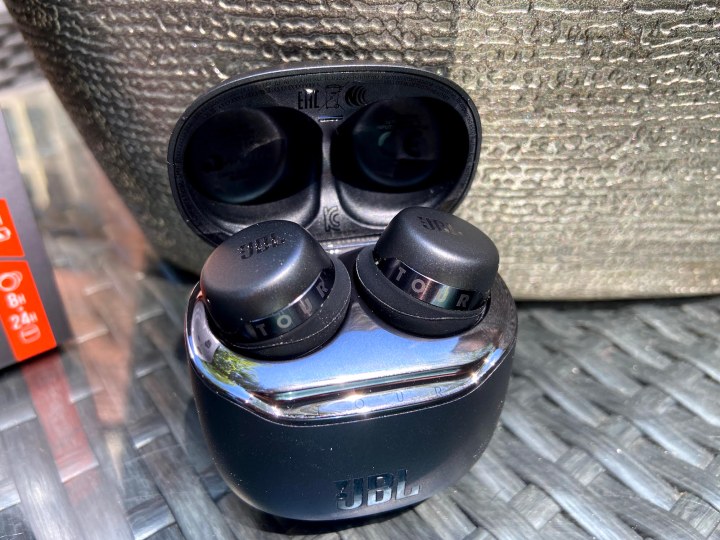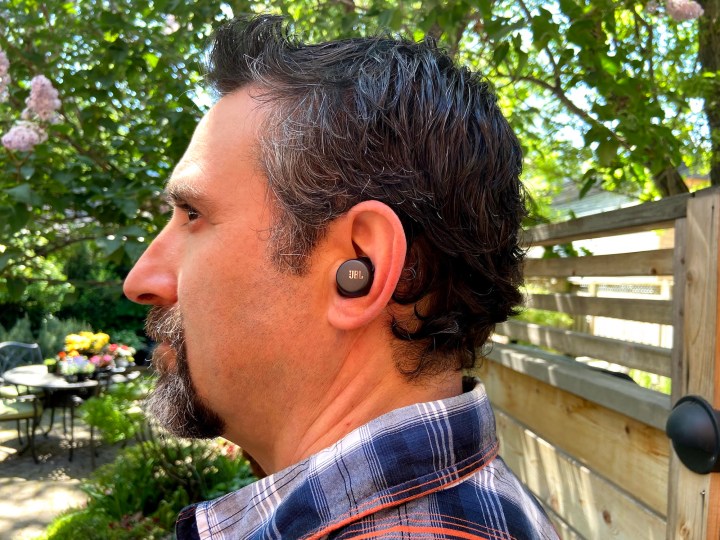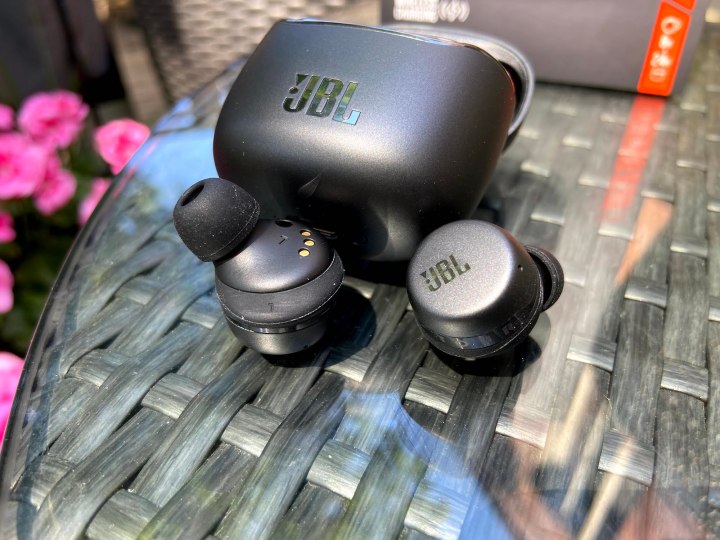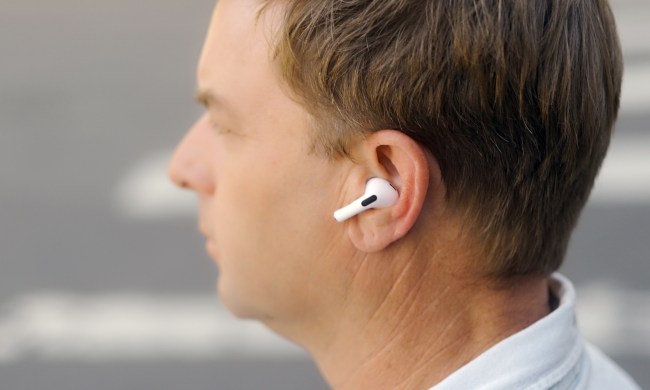- Elegant design
- Very good sound quality
- Excellent call quality
- Good battery life
- Hands-free voice assistants
- Awkward controls
- Mediocre noise canceling
- No wake-word support in iOS
Looking for a set of noise-canceling true wireless earbuds that don’t look like small golf tees protruding from your ears? JBL’s $200 Tour Pro+ are your latest option. They’re slickly designed, compact, and they let you speak to Alexa or Google Assistant without needing to tap an earbud — a trick that even Apple’s AirPods can’t manage.
But do the rest of the Tour Pro+’s features measure up, and should you add them to your shortlist? Let’s find out.
What’s in the box?

JBL’s soundbar team has definitely read the sustainable packaging memo — the new JBL Bar 5.0 Multibeam is a perfect example of how to make a box and its contents fully recyclable. But apparently, the earbuds team missed that email. The Tour Pro+ come in a heavily coated box with magnet closures and lots of hard-to-recycle foam and plastic.
Inside, you’ll find the earbuds, their charging case, a USB-C charging cord, five sizes of eartips, two sizes of wing tips, and several printed quick start guides.
Design

JBL’s Tour lineup, which consists of the Tour Pro+ earbuds and the Tour One ANC headphones, possesses an understated yet sophisticated design. Satin-finish plastics, subtle logos, and just a few high-polish accents give the Tour Pro+ a very high-end vibe.
The earbuds use touch-sensitive surfaces, so there is very little to interrupt their clean lines. Size-wise, they’re similar to Jabra’s Elite 75t, sticking out from your ear just enough to make them easy to insert and remove. An IPX5 rating offers very good protection from sweat and water (just don’t immerse them).
Their charging case, which can be charged wirelessly or via the included USB-C cable, isn’t quite as compact as the AirPods Pro, but it’s still highly pocketable. The lid opens and closes smoothly and the hinge keeps the lid open until you’re ready to close it — something many cases can’t claim. The case can stand vertically if you’re careful, but it’s really meant to lie flat on its back, which lets it charge wirelessly while also exposing the charging status LED on the bottom, next to the USB-C port.
The Tour Pro+ snap in and out of their charging sockets with ease thanks to their slightly angled position, but take care when re-docking them: They can sometimes fail to align perfectly with their charging contacts. Each socket has its own LED indicator so it’s easy to tell if something’s not quite right.
Comfort, controls, and connections

I found that the default medium cone-style silicone ear tips were perfect for me. Once nestled in my ear, the Tour Pro+ were very comfortable and secure. Going for a jog or pavement or pounding away on a treadmill shouldn’t budge them at all.
The Tour Pro+ come with a tiny set of wing tips installed, though that term seems inappropriate. They’re really more like mini-fins. But regardless of what you call them, they didn’t do much for me in terms of extra stability. I think they’re designed to fit just under the antihelix — that fold of cartilage in the outer ear — but I guess my antihelixes are too big (weirdest brag ever). If they actively get in the way or they’re uncomfortable, you can swap them out with flat silicone bands.
Bass response is excellent without being overbearing, and there’s plenty of detail through the midrange.
Inside the JBL Headphones app, which you will definitely want to download to get the best from the Tour Pro+, there’s a fit test that helps you figure out if you’re using the best ear tips for your ears. It’s worth doing: A poor fit will compromise both the active noise cancellation (ANC) and sound quality.
Though I still prefer physical buttons, the Tour Pro+ has very responsive touch controls, which provide audible feedback tones when you tap them. I wish all touch controls did this — there’s nothing worse than not knowing if your tap was recognized or not.
Unfortunately, JBL has somewhat kneecapped these great touch controls by enforcing a very limited set of customizations. Instead of letting users assign one function per gesture per earbud, each earbud must be assigned a function “group.” The playback control group gives you play/pause and track skip forward/back. The volume control group lets you turn the volume up or down. Voice assistant lets you trigger your chosen assistant with a gesture (more on this later), and ambient sound control lets you switch from ANC modes and toggle TalkThru on and off.
The ambient sound control group might be the most confusing of them all. With a single tap, you can switch between ANC, ambient sound, and off (no ANC or ambient). But a double tap lets you turn TalkThru on and off. Since TalkThru and ambient mode are almost indistinguishable, I think JBL should have simplified this, making the single tap all you need to switch between ANC and ambient.
You can have any two of these groups active at once, which means choices must be made. If you want playback control (and who doesn’t?) that means you need to decide which of the other four matter most. Want to control ANC and volume? You can, but only if you give up playback control. These are not choices we should be forced to make.
Built-in wear sensors automatically pause music when you pop an earbud out and play when you put it back in. The feature works really well, pausing and playing quickly in response to changes, but oddly, it only worked on the left earbud. You can also disable this in the Headphones app.
Calling on the Tour Pro+ is very good. My voice was clear as a bell.
You can choose to use just one earbud at a time, but make sure you assign the controls you need to the earbud you’re using. Don’t worry about call answer/end — these functions work on both sides, regardless of which control group you choose.
Bluetooth connection quality is excellent. Indoors, I was able to put three stories between my iPhone 11 and the Tour Pro+ without dropping the signal, and that will likely translate into very good outdoor performance too.
Sound quality

Out of the box, and with the right size of ear tips installed, the Tour Pro+ have a very balanced sound signature. Bass response is excellent without being overbearing, and there’s plenty of detail through the midrange. Highs are a little muted, but still very enjoyable.
But the JBL Headphones app really allows you to dramatically alter how the Tour Pro+ behave, with several presets and one custom option. My favorite is the Club One EQ, which boosts bass and treble a lot and gives a smaller bump to the midranges. It really woke these earbuds up, increasing the energy and seemingly expanding the already fairly generous soundstage. Vocals received the biggest boost, with much better clarity.
The Tour Pro+ aren’t going to shake your teeth loose with their bass — if you want that, try the JBL Reflect Mini NC — but the low-end is warm, resonant, and more than punchy enough to let you enjoy bass-forward tracks like Billie Eilish’s Bad Guy or Hans Zimmer’s Time.
They’re better balanced than Jabra’s similarly-priced Elite Active 75t and even compare favorably to Sennheiser’s CX400 BT for overall sound quality.
Battery life
JBL claims six hours of playback per charge for the Tour Pro+ earbuds and I found that to be almost exactly what I got when playing music at 50% volume. If you turn ANC off, you should get eight hours, but I didn’t test this. That handily beats Apple’s AirPods Pro (4.5 hours with ANC on).
The charging case holds three full recharges, giving you a total of 24 or 32 hours before needing to find a wireless (or wired) charging spot.
Whether in Ambient Aware or TalkThru modes, it was easy to listen to conversations and stay aware of traffic.
Speaking of wireless charging, I found the charging case was very picky about its location on my charging mat. If it wasn’t dead-center, it wouldn’t charge and even then, my charging mat occasionally lost its connection. That’s not something I’ve run into very often, so it’s possible it was just my particular review unit.
Noise cancellation and transparency

ANC on the Tour Pro+ is calibrated heavily in favor of low-frequency sounds. It works best for counteracting engine and tire sounds from traffic, or the vibrations of machinery that might work their way through walls.
I found that higher frequencies, like the sound of a bathroom fan, weren’t blocked out as effectively, and there’s no way to adjust the intensity of the ANC feature to increase the amount of noise it deals with.
JBL has packed so many features into the JBL Headphones app, I’d say it’s mandatory.
It’s what I’d call a general-purpose ANC. It takes the edge off, but doesn’t really go for that cone-of-silence effect. If that’s what you want, both the Jabra Elite Active 75t and the Sony WF-SP800N proved more capable of blocking a full range of frequencies.
I do like the fact that JBL includes what it calls a “silent now” mode: Hold the two touch surfaces for five seconds and the Tour Pro+ keep ANC engaged, but turn off Bluetooth so you can get some extra peace and quiet without killing your battery.
Transparency (or ambient mode) works really well. Whether in Ambient Aware or TalkThru modes, it was easy to listen to conversations and stay aware of traffic.
Voice assistant access
One of the coolest features on the Tour Pro+ is their ability to not only work with both Alexa and Google Assistant (there are several earbud models that already do this), but also give you wake-word access to them so you don’t have to continually reach for an earbud.
Just say, “Hey Google,” or “Alexa,” and your chosen assistant is at the ready, waiting for you to speak a command.
You have to choose which one you want as your active assistant in the Headphones app, but switching from one to the other only takes a few seconds.
I found both assistants responded effortlessly in a variety of situations.
There is one very unfortunate caveat: Wake-word access only works on Android devices at the moment.
If you want wake-word access on an iPhone, you’ll need Apple’s AirPods or the Amazon Echo Buds.
Call quality
Whether on a busy street or in a quiet location, calling on the Tour Pro+ is very good. Some occasional very loud sounds would overpower my voice, but for the most part, it was clear as a bell and surprisingly full-sounding.
When indoors or in a quiet outdoor location, I suspect your callers won’t even know you’re using a set of earbuds for your calls.
Extras
Normally headphone apps don’t do a whole lot, but JBL has packed so many features into the JBL Headphones app, I’d say it’s mandatory for Tour Pro+ users. It enables:
- Find my earbuds
- Custom EQ
- Custom controls
- Eartip fit test
- Battery life indicators
- Voice assistant selection
- Audio mode selection
- My Alarm (which lets you set an amount of time for music to play before switching the earbuds to Silent Now mode for sleeping)
Our take
With the Tour Pro+, JBL delivers a well-priced, elegantly designed set of true wireless earbuds. They sound great, have very good battery life and call quality, and their wake-word access for voice assistants (on Android) is a rare and helpful feature.
Their mediocre ANC and awkward control options are drawbacks, but definitely not deal-breakers.
Is there a better alternative?
I’m hard-pressed to find a set of true wireless earbuds at the same price that goes toe-to-toe with the JBL Tour Pro+ in terms of features and quality, except for maybe JBL’s own Club Pro+. They’re the same price, and while they lack wake-word access to assistants, some folks will prefer their more bass-heavy sound signature.
For a more workout-friendly option, Sony’s $199 WF-SP800N have great battery life, great sound, and better ANC than the Tour Pro+. But they’re not as good for phone calls and lack wireless charging and wake-word assistant access. However, they’re compatible with both Alexa and Google Assistant.
JBL’s own $150 Reflect Mini NC are also solid contenders for fitness fanatics. Sound quality is once again more bass-heavy, but these earbuds share many of the same features as the Tour Pro+.
How long will they last?
JBL builds very good products and the Tour Pro+ are no exception. High-quality materials and excellent fit and finish abound. They come with a one-year warranty from JBL and I expect they’ll last for many years of use.
Should you buy them?
Yes. Despite their weird controls, the Tour Pro+ are a feature-rich set of great-sounding ANC earbuds.










